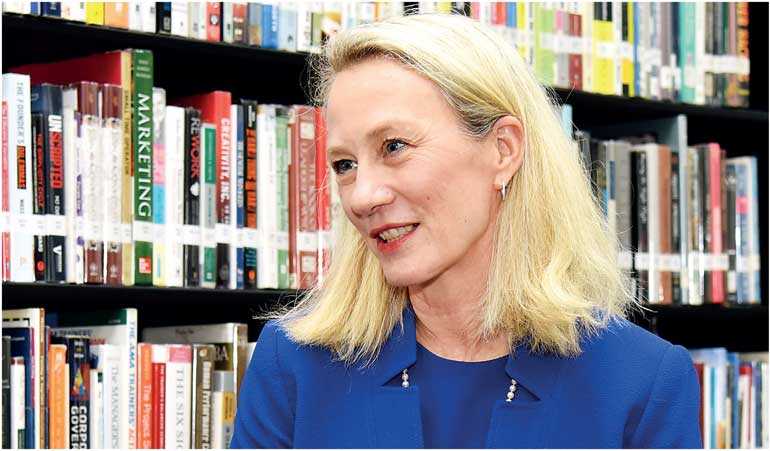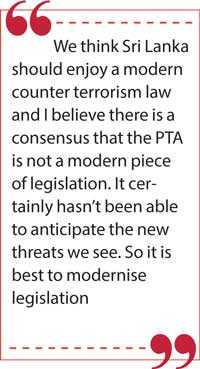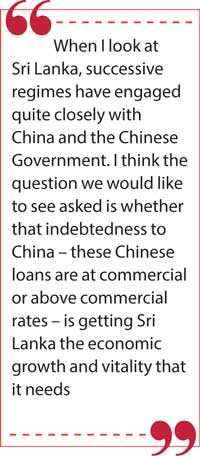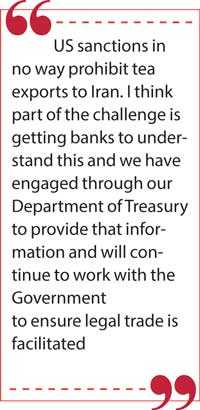Wednesday Feb 18, 2026
Wednesday Feb 18, 2026
Wednesday, 21 August 2019 00:00 - - {{hitsCtrl.values.hits}}

Acting Assistant Secretary for South and Central Asian Affairs Alice Wells on her recent visit sat down with the Daily FT to discuss a range of issues that span different aspects of US engagement with Sri Lanka that included counter terrorism cooperation, the US Indo-Pacific strategy and economic growth opportunities
By Uditha Jayasinghe
Q: What is the objective of your visit to Sri Lanka?
We are here for bilateral consultations and it is an opportunity for me to discuss in greater detail the ambitions of the Trump administration’s Indo-Pacific strategy. I also wanted to convey personally the Secretary’s regret that he was not able to visit Sri Lanka himself on his last trip due to scheduling reasons and to have an opportunity to go by the church, for instance, to express my condolences on the Easter Sunday attacks, which were both horrific but also a reminder of the importance of international cooperation and growing our own relationship in the area of counter-terrorism cooperation.
Q: Since the Easter Sunday attacks there has been increased engaged on counter-terrorism between the US and Sri Lanka. Could you please give us an update on that?
In the immediate aftermath of the attacks we were obviously focused on responding to any requests for information or assistance from the Government specifically related to the Easter Sunday attacks but subsequently our discussions have broadened about actively cooperating on what we know will be a continuing challenge.
As we look at the defeat of ISIS in Syria and Iraq, we are seeing the dispersion of foreign fighters globally and a real focus by ISIS on the Indo-Pacific region and they recently announced new sub-units in Pakistan, India and Bangladesh. So we know the interest of terrorists continues to be in breaking all civilisation and norms and carrying on the form of life that our countries truly value.
So what we have discussed is how to effectively share information as we collect information about foreign terrorist fighters and threats, ensure that our agencies are passing on information and using it effectively. How do we share best practices on countering violent extremism, rehabilitation of extremists, judicial tactics, and gather evidence in a terrorism trial.
These are often very, very complicated and you can see that in the hesitancy of even some of our European partners to bring back foreign terrorist fighters from Syria because of their own hesitancy on how to take up these difficult cases in a judicial setting. Sri Lanka continues what is a very important process of amending its prevention of terrorism laws being able to enshrine best practices and best techniques in successful piece of legislation is critical.
Q: So you broadly think the CTA is a good idea and that process should continue?
We think Sri Lanka should enjoy a modern counter terrorism law and I believe there is a consensus that the Prevention of Terrorism Act is not a modern piece of legislation. It certainly hasn’t been able to anticipate the new threats we see, such as the cyber dimension for instance, so in the normal course of events it is best to modernise legislation and we obviously welcome the opportunity to share our experiences and best practices. We share with countries around the world, for instance with Interpol to maintain databases of foreign terrorist fighters.
Obviously in an age of information you want to push information out. I cannot imagine Sri Lanka literally wants to be an island unto itself, particularly given what we imagine to be the external influence on the terrorist attackers. So I think this is exactly one of those things that underscores how inherently there has to be an international response, we can’t close ourselves off. When we look at the challenge posed by social media, this requires international cooperation across the board and a lot of humility and learning lessons of other countries in countering extremism.
Q: Social media’s impact on democratic space, free and fair elections and the spread of sectarian violence has been well documented. But do you think the response from companies such as Facebook, which are all based in the US, have been adequate? 
: I think we are all learning to deal with what is a morphing threat. Technology that was introduced with the idea of letting dorm mates exchange information easily has become something quite different. So dealing with the global reality, whether it is Facebook or twitter or Instagram, requires agility on our part. We don’t have the final answers yet on how to manage social media in the political space.
Q: Do you think more needs to be done by the US Government to hold these companies accountable? Do you feel enough is done to hold these very powerful companies accountable for how their platforms are being used in other parts of the world?
A: We think it is very important that Facebook is responsive to concerns over the misuse of its platforms and we have seen Facebook respond recently to these concerns, increasing the number of people they are hiring who speak local languages, who can understand the connotation of posts. This is very much an alive issue, which requires ongoing discussion and debate and in our own capacity as an embassy we have tried to broker exchanges between social media platforms and the Sri Lankan government because it is important that they hear concerns directly.
Q: One of the positive things about social media is how it has assisted start-ups, which is one area where the US Embassy is involved in.
Sri Lanka has so much untapped potential. I think you have 1.7 million Sri Lankans working outside the country and while I don’t dispute the importance of remittances that is talent that is not being utilised inside the country. Entrepreneurship and empowering small and medium enterprises is a critical catalyst for job creation. It is also a critical catalyst for bringing women into the market place, women entrepreneurs tend to hire more women.
This is something we talk to the Government about, it is something we have programs on, whether it is to support micro loans or encouraging regulations that make it easier for venture capital or angel investors but this is an area where we hope the government also turns its attention to.
Q: There is currently controversy surrounding three agreements to be signed between Sri Lanka and the US. What are your views on these proposed agreements?
I would separate agreements that administratively ease our ability to cooperate with military cooperation itself. The reality is we are expanding and have been able to expand our military cooperation with Sri Lanka, since the end of the war and each of our services have more dialogue with one another, we engage in exercises with one another, we recently donated a frigate to the Sri Lankan Navy, which was used to by the Sri Lankan Navy to interdict an illegal Iranian dhow in our waters. So I think the benefits of military cooperation are palpable, particularly when you look at the Indian Ocean. We see a region with real threats of terrorism, trans-national crime, of trafficking, piracy; these are all common ills we can share a consensus about. 
Under the Indo-Pacific strategy of the administration, one branch is on how we can improve our security, and under the Bay of Bengal initiative we recently allocated $ 40 million to provide military assistance to the Sri Lankan armed forces so we can work together more effectively. During the tsunami the first responders were the US military and being able to come and provide the necessary relief and the manpower to tackle the enormous humanitarian challenges is important. So the humanitarian assistance and disaster relief component of our cooperation is also going to be very important. As a trading nation Sri Lanka absolutely relies on free and open Indian Ocean and Indo-Pacific. We too believe in those values being enshrined in the Indo-Pacific and are concerned by some of the challenges we have seen to the free and open regime.
Q: What are those challenges?
A: We have clearly seen the militarisation in the South China Sea. We have seen efforts by countries to assert sovereignty over international waterways so I think we have to take those steps seriously, and whether it is the US or the US working in consult with likeminded partners, to have an effective response to ensure that we are working together to push back efforts to restrict markets.
Q: As you know Sri Lanka is scheduled to have Presidential Elections at the end of this year and there is a possibility that a more pro-China Government may come to power. How do you view this possibility?
Sri Lankans are going to elect who they want to lead them. That is not something an American decision or an area where America needs to give an opinion or advice. I think what I see when I look at Sri Lanka is successive regimes engaging quite closely with China and the Chinese Government. I think the question we would like to see asked is whether that indebtedness to China – these Chinese loans are at commercial or above commercial rates – is getting Sri Lanka the economic growth and vitality that it needs.
Now, unfortunately the New York Times report laid out quite clearly the cost to Sri Lanka of the Hambantota Port, the loss of sovereignty over this vital port and the lack of choice given to Sri Lanka in that instance. We believe all countries that engage commercially in Sri Lanka should do so upholding the highest possible standards, whether it is environmental standards, labour standards, but also the standard of sustainability and what I am proud of is America’s engagement with Sri Lanka has been in the form of grant assistance.
Since Sri Lanka’s founding we have provided $ 1 billion in aid, not loans. I think we continue to be the largest grant provider of assistance to Sri Lanka and we are committed to any Sri Lankan government as it navigates lifting its people up the socio-economic ladder. Sri Lanka is facing an interesting transition, you are about to be promoted to upper-middle income status, which is a terrific step forward, it also brings with it a need to rely more on the private sector and markets because the kind of grant assistance of the old days is going to go away.
So this is America’s competitive advantage, our private sector has already invested about $ 1.5 trillion in the Indo-Pacific region, there are trillions more dollars locked up in equity that would like to find a market to come to and I think that by working together to address the questions of ease of doing business and the larger business environment we can be most effective by allowing Sri Lanka to tap into its economic potential.
Q: But many experts are concerned at the slow rate of economic reforms in Sri Lanka, which have impacted growth. What do you think needs to change and how can US engagement improve reforms?
I had the opportunity to meet with American multinationals who are already present in Sri Lanka, so companies see the promise of Sri Lanka and see opportunities in Sri Lanka. But as Sri Lanka graduates to upper middle income status and you see trade relations, for example between America and China being disrupted, there are opportunities for Sri Lanka to make itself part of that global supply chain. As companies de-risk in China the opportunities for greater manufacturing in Sri Lanka are there. It is going to require actions by governments to be agile and responsive to legitimate concerns raised by business.
We have a Trade and Investment Framework Agreement (TIFA), a set of conversations with the US trade representatives and that always boils down to things like intellectual property rights, predictability of taxes, and transparency. I think the Government has taken a positive step in consulting more with business. We believe given the right circumstances and commitment to reform and transparency there are many more US companies that would like to be involved in Sri Lanka.
Q: You touched on the US-China trade war and the concern now is this is spilling over to slow growth in developed countries. The US and EU are Sri Lanka’s largest exporters and dealing with a trade war could be challenging. How do you view this situation?
I would not call it a trade war. I would say it is a demand for fair and reciprocal trade, so America is going to pursue its trade relations not just with China but with the rest of the world, to seek equal terms for US companies. But this is always a win-win situation. We already have a pretty robust trade relationship, Sri Lanka benefits from having access to GSP, and there are real opportunities to grow and diversify by that trade relationship beyond high end textiles. With diversity comes opportunity and we see countries around the world taking advantage of these new opportunities, whether it is Vietnam or Bangladesh or elsewhere that are seeing high rates of growth in investment.
Q: The Bangladesh growth story is an impressive one but what can other, smaller, South Asian countries do to increase trade and make use of being in the fastest growing region in the world?
We have been preaching for more than a decade the virtues of regional connectivity. As you know South Asia has the lowest levels of inter-regional trade and whether it is Afghanistan or the disputes between India and Pakistan, that have prevented growth of trade East-West. There is much potential for growth within South Asia as we achieve greater regional stability and peace. 
I would say our efforts to promote a political settlement in Afghanistan is very significant for the region. We are looking forward imminently to an agreement among the parties, the Afghanistan government and leading members of Afghan society with the Taliban to sit at the negotiating table. Peace in Afghanistan would be great step forward.
Q: Are you concerned with the standoff between India and Pakistan over Kashmir?
We believe that while Kashmir is an internal issue it needs to be discussed between India and Pakistan. We want to see increased regional stability and obviously resolution of disputes including the issue of cross-border terrorism. It would also contribute to economic growth.
Q: US sanctions on Iran have created challenges for the Sri Lankan tea industry. What is being done to resolve those issues?
US sanctions in no way prohibit tea exports to Iran. I think part of the challenge is getting banks to understand this and we have engaged through our Department of Treasury to provide that information and will continue to work with the Government to ensure legal trade is facilitated. On the question of oil we have worked hard with countries like Saudi Arabia and UAE to ensure there is adequate supply in the market and I think that prices are actually lower today than they were prior to sanctions going into effect.
We see an Iranian regime that is intent on being a spoiler in the international system. This is an Iranian regime that is sponsoring Houthis, shelling Saudi cities, sponsors Hizbullah and other terrorist groups. This is an Iranian regime that is targeting ships carrying oil in the Persian Gulf in a deliberate act to disrupt markets. So we should not be under any illusion about who is the threat and the importance of sanctions in this context.
Q: There is concern that Sri Lanka’s reconciliation process has slowed down significantly. How do you see this situation and do you think the Government should continue to work on the pledges made before the United Nations Human Rights Council (UNHRC)?
I think reconciliation is fundamentally in Sri Lanka’s interest. Unfortunately the Easter Sunday attacks showed us the dangers of communal disharmony and the war itself underscored that, the high cost Sri Lanka paid for not tackling fundamental differences between communal groups. We welcome the fact the Sri Lankan Government has renewed pledges to operationalise and continue initiatives like the Office of Missing Persons, reparations, return of land and the outstanding challenges of devolution of power and Constitutional reform.
When I consult with members of Congress and with senior Congressional staff, they are very interested in the steps Sri Lanka is taking. I think to the degree that Sri Lanka moves down this path, which is quite difficult, there are hard feelings and concerns on all sides, but as Sri Lanka moves down that path it’s recognised. It’s recognised by donor partners like the US and EU. It’s also recognised in the peace and stability it will engender at home.
We believe that the commitments that were made are very valuable; we would welcome and encourage the Government to continue to implement these commitments and as the Government does so you will enjoy, certainly our support, and the support of likeminded countries. What Sri Lanka is doing, it is doing for itself. This is not about pleasing the international community. It is about taking fundamental steps to address grievances that ripped this country apart at one point.